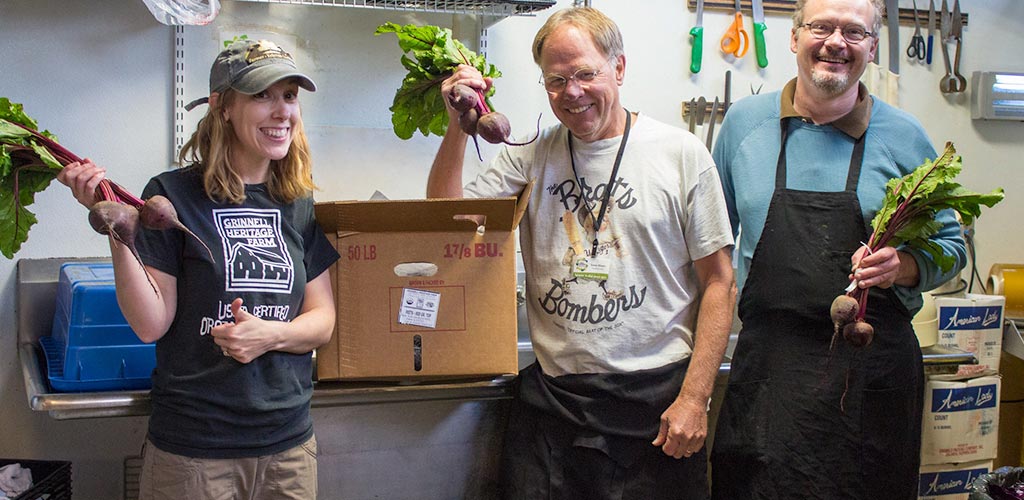From the Blog
Grinnell Heritage Farm on Growing Organic: The Local Farm to Customer Connection

Meet Andy & Melissa of Grinnell Heritage Farms.
You may have seen them at the farmers market or dropping off produce at our stores. They are local Iowa farmers here to share their story about organic farming.
Transcript
[Melissa] I'm Melissa Dunham and I farm at Grinnell Heritage Farm with my husband Andrew here.
[Andrew] So the farm has been in my family for 160 plus years and it started out as a diversified farm like most of them in Iowa were and it gradually contracted down to the corn-soybean alternation and then I was given the opportunity to come and farm and we've diversified again and so on 80 acres we get all of our family's income off of those 80 acres –mostly selling organic produce.
[Andrew] So when you come to the Co-op to buy a beet it's not like we're just picking it and then taking it straight to the grocery store. By the time we pick it up off the ground and put it into a crate and onto the tractor and into the packing shed and into the cooler and out of the cooler and into the barrel washer and out of the barrel washer and back into the cooler and then onto the truck and to the Co-op, we might actually lift it ten times.
[Melissa] We're very strong! [laughs]
[Andrew] One of the advantages of raising crops in an organically managed system, where you have as a very explicit goal trying to sequester carbon into the soil, is that we can actually fight climate change through healthy eating. For every 1% you increase your soil organic carbon, you’re sequestering about 20,000 pounds of CO2 – and we have millions of acres of farmland that we could be doing this on.
[Melissa] Growing organically is definitely more labor-intensive so the upfront cost of organic are more expensive, you know, for us as farmers and possibly for you, you know, when you're getting it off the shelf. What people don't recognize are the long-term costs, not only to the environment, but people's health, when we're not eating food that’s sustainably grown or organically grown.
[Andrew] One of the biggest challenges that we see facing agriculture currently is chemical spray drift – which I like to call a chemical trespass, in that you're applying chemical to a farm, maybe a neighboring farm, and the wind comes up and blows that over, say my farm, and kills my crops.
When we had chemical drift on our farm we had to cordon off that area and it became a non-organic field and it was managed as such for another three-year transition period before we could bring it back into organic management. This is something that we really need people to reach out to their state legislators and on a national level we really need to push for stronger control of chemical trespass.
[Melissa] Working with the Co-op has been pretty instrumental in getting our business off the ground. A lot of people think that we've been around forever, but our business is only 11 years old. We wouldn't be the farmers we are today if we hadn't had the opportunity to work with New Pi.
Every time that you vote with your food dollar and you buy Team Carrot’s carrots or, you know, James Nisly’s greens, or Derek Roller’s garlic, you're supporting your local effort; you're supporting the guy in your backyard.
[Andrew] We keep farming this way because this is what I really enjoy doing and we believe that we can do good by the environment and good for society by raising crops organically in a fashion that we're doing so in Grinnell, and we'd like to keep doing so to show people that it can be done this way.
